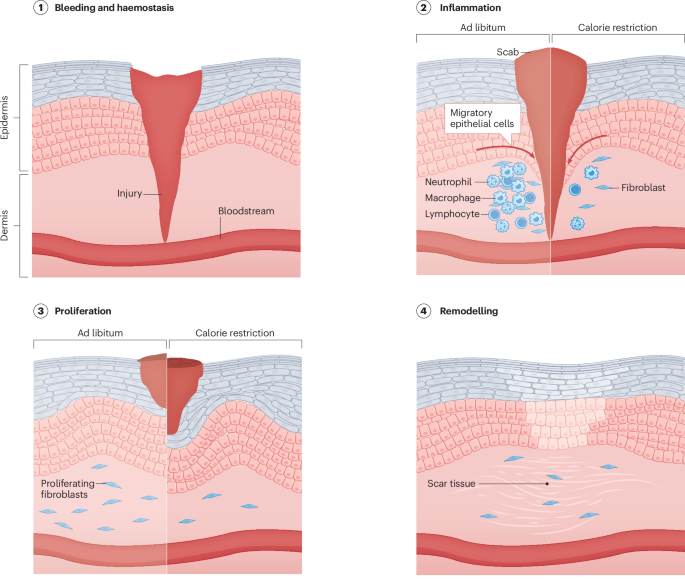Eddy Edson
Well-Known Member
- Relationship to Diabetes
- In remission from Type 2
New review paper from John Speakman's group (ie one of the leaders in this field).

 www.nature.com
www.nature.com
Paywallled, unfortunately, but the abstract is informative:
Although the potential benefits of calorie restriction on human lifespan remain uncertain, it is currently one of the most extensively researched non-genetic approaches to extending both lifespan and healthspan in animals. Calorie restriction offers numerous health benefits, including a reduced incidence of age-related diseases. However, calorie restriction also produces a range of negative effects, which are not fully documented and require further investigation, particularly in humans. As the viability of calorie restriction in humans will depend on the balance of benefits and detrimental effects, it is crucial to understand the nature of these negative effects and what drives them. In this Review, we summarize the effects of calorie restriction on wound healing, hunger, cold sensitivity, bone health, brain size, cognition, reproductive performance and infection, primarily based on studies of rodents with some data from other species and from humans. Overall, the detrimental effects of calorie restriction seem to stem directly from prioritization of vital functions and downregulation or suppression of energy-demanding processes, which helps preserve survival but can also lead to impaired physiological performance and increased vulnerability to stressors. The exact mechanisms underlying these effects remain unclear. Whether it might be possible to engage in calorie restriction but avoid these negative effects remains uncertain.
Yes, it's mainly mice; deal with it.
I think a main takeaway is that it's probably best to have guidance from a good nutritionist when embarking on substantial weight loss.
Thread by Speakman with discussion:

Potential downsides of calorie restriction - Nature Reviews Endocrinology
Calorie restriction extends lifespan in many animal models; however, the effects in humans and the mechanisms of action are not clear. This Review summarizes evidence regarding potential adverse effects of calorie restriction and highlights the complexity of extrapolating findings from animal...
Paywallled, unfortunately, but the abstract is informative:
Although the potential benefits of calorie restriction on human lifespan remain uncertain, it is currently one of the most extensively researched non-genetic approaches to extending both lifespan and healthspan in animals. Calorie restriction offers numerous health benefits, including a reduced incidence of age-related diseases. However, calorie restriction also produces a range of negative effects, which are not fully documented and require further investigation, particularly in humans. As the viability of calorie restriction in humans will depend on the balance of benefits and detrimental effects, it is crucial to understand the nature of these negative effects and what drives them. In this Review, we summarize the effects of calorie restriction on wound healing, hunger, cold sensitivity, bone health, brain size, cognition, reproductive performance and infection, primarily based on studies of rodents with some data from other species and from humans. Overall, the detrimental effects of calorie restriction seem to stem directly from prioritization of vital functions and downregulation or suppression of energy-demanding processes, which helps preserve survival but can also lead to impaired physiological performance and increased vulnerability to stressors. The exact mechanisms underlying these effects remain unclear. Whether it might be possible to engage in calorie restriction but avoid these negative effects remains uncertain.
Key points
- Calorie restriction extends lifespan in a wide variety of organisms but it produces a range of both positive and negative impacts; the extent of lifespan extension depends on the balance of positive and negative effects.
- Calorie restriction delays wound healing, increases hunger and decreases metabolic rate, which leads to reduced body temperature and increased cold sensitivity.
- Bone mineral density generally declines in animals under calorie restriction, which might be appropriate relative to the extent of unloading when the animals lose body weight; hence, reduced bone mineral density might not be an adverse outcome.
- During calorie restriction, most organs shrink in size, including the brain (although cognitive impairment does not seem to occur); effects on the immune system are unclear, with some studies showing positive effects and others showing negative effects.
- Most animals under calorie restriction have impaired reproductive functions (with humans showing decreases in libido and quality of sexual life); however, when released from restriction, animals might show improvements relative to age-matched controls.
- Overall, the negative effects of calorie restriction seem to stem directly from the reduced availability of calories to support expensive functions and individuals having to prioritize energy use for immediate survival.
Yes, it's mainly mice; deal with it.
I think a main takeaway is that it's probably best to have guidance from a good nutritionist when embarking on substantial weight loss.
Thread by Speakman with discussion:
